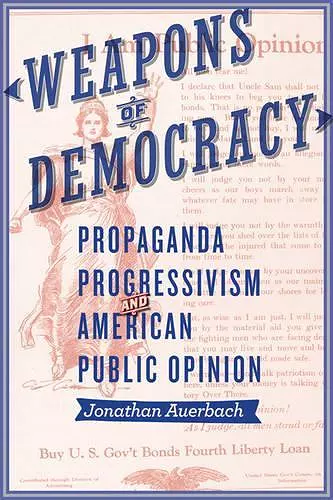Weapons of Democracy
Propaganda, Progressivism, and American Public Opinion
Format:Hardback
Publisher:Johns Hopkins University Press
Published:16th Oct '15
Currently unavailable, and unfortunately no date known when it will be back

An unnerving and chilling book that is also clear, compelling, and fast-paced, Weapons of Democracy is a powerful achievement. -- Bill Brown, University of Chicago, author of A Sense of Things: The Object Matter of American Literature Auerbach has written an aggressive and impressive account of how public opinion emerges as a topic of debate in the Progressive era: reputedly sovereign but increasingly subject to modes of management, organization, synchronization, persuasion, and coercion. By focusing on the individual careers of (in)famous propagandists, Auerbach clearly traces how their aspirations went awry. He also persuasively and patiently examines the work of their most profound critics-Walter Lippmann and John Dewey-thereby demonstrating the difficulty of imagining, as the twentieth century progressed, what a democratic public might be. An unnerving and chilling book that is also clear, compelling, and fast-paced, Weapons of Democracy is a powerful achievement. -- Bill Brown, University of Chicago, author of A Sense of Things: The Object Matter of American Literature
Truly interdisciplinary in both scope and method, this book will appeal to students and scholars in American studies, history, political theory, media and communications, and rhetoric and literary studies.Following World War I, political commentator Walter Lippmann worried that citizens increasingly held inaccurate and misinformed beliefs because of the way information was produced, circulated, and received in a mass-mediated society. Lippmann dubbed this manipulative opinion-making process "the manufacture of consent." A more familiar term for such large-scale persuasion would be propaganda. In Weapons of Democracy, Jonathan Auerbach explores how Lippmann's stark critique gave voice to a set of misgivings that had troubled American social reformers since the late nineteenth century. Progressives, social scientists, and muckrakers initially drew on mass persuasion as part of the effort to mobilize sentiment for their own cherished reforms, including regulating monopolies, protecting consumers, and promoting disinterested, efficient government. "Propaganda" was associated with public education and consciousness raising for the good of the whole. By the second decade of the twentieth century, the need to muster support for American involvement in the Great War produced the Committee on Public Information, which zealously spread the gospel of American democracy abroad and worked to stifle dissent at home. After the war, public relations firms-which treated publicity as an end in itself-proliferated. Weapons of Democracy traces the fate of American public opinion in theory and practice from 1884 to 1934 and explains how propaganda continues to shape today's public sphere. The book closely analyzes the work of prominent political leaders, journalists, intellectuals, novelists, and corporate publicists, including Woodrow Wilson, Theodore Roosevelt, Mark Twain, George Creel, John Dewey, Julia Lathrop, Ivy Lee, and Edward Bernays. Truly interdisciplinary in both scope and method, this book will appeal to students and scholars in American studies, history, political theory, media and communications, and rhetoric and literary studies.
Weapons of Democracy has clear implications for contemporary politics... Recommended. Choice Understanding the history of propaganda and public opinion presented in this stimulating and intelligent book offers one step in the right direction. The Journal of American History ... a captivating read. Journal of American Studies ... a bracing deep history of our present 'post-fact' moment. American Literary History
ISBN: 9781421417363
Dimensions: 229mm x 152mm x 21mm
Weight: 454g
232 pages